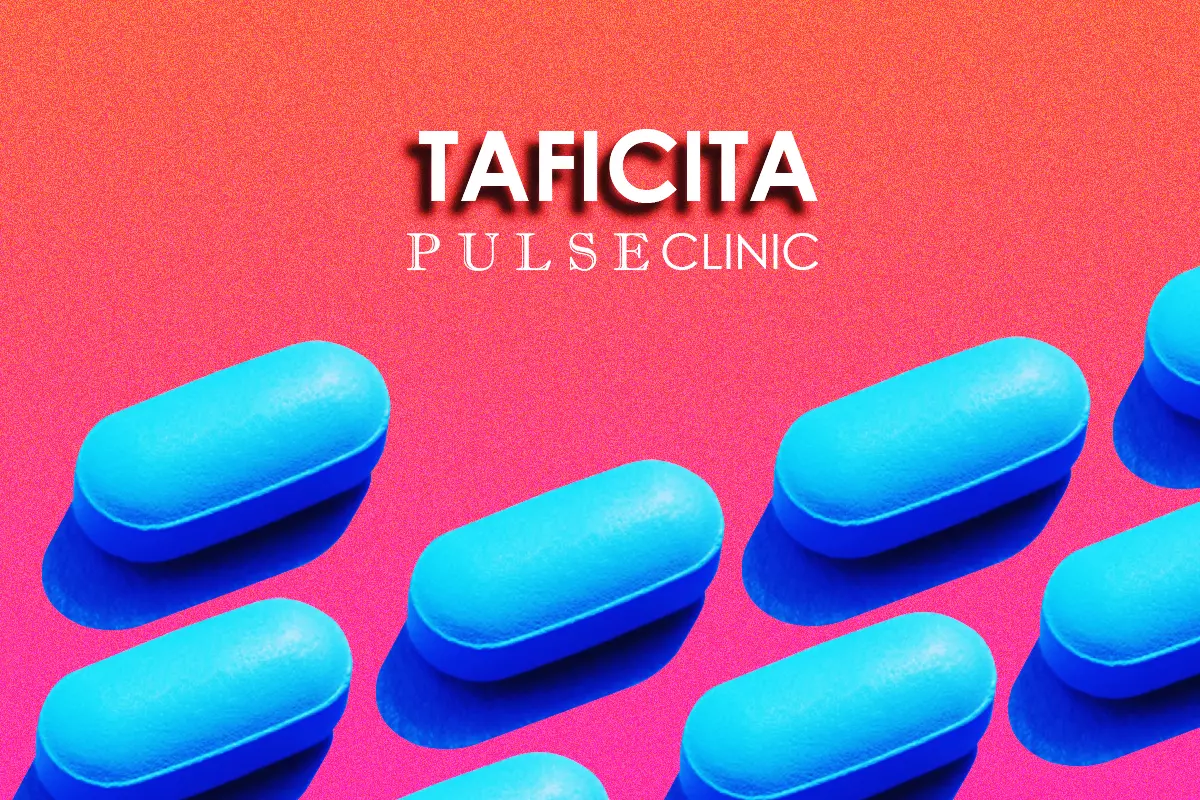Get a Year Supply of the Original Biktarvy for HIV Treatment in Thailand (Bangkok, Phuket, Pattaya, Chiang Mai)
57069
Buy Biktarvy for HIV Treatment Online in Thailand. Now Available at Bangkok, Phuket, Pattaya, Chiang Mai, and Koh Samui.

Get a Year's Supply of Original Biktarvy in Thailand
Written by Dr.Deyn on 28 June 2020, last reviewed and updated by Dr. Deyn on 30 October 2023
Biktarvy is a complete, once-a-day prescription medication used to treat HIV-1. Get Biktarvy (Bictegravir, emtricitabine, and tenofovir alafenamide) for HIV treatment delivered to you right now!
Order Biktarvy online and deliver to your doorstep today!

For more information about the medication and ordering process,
please email pulseliving@pulse-clinic.com or chat on your preferred platform.
![]() +66-84-226-2569
+66-84-226-2569  @pulserx
@pulserx ![]() PulseClinic
PulseClinic
Guess what? There’s a new HIV pill that can keep your viral load undetectable for two years or more! It’s called Bicctegravir and doravirine, and it’s been shown to work well in clinical trials. A lot of people who started taking it kept their viral load low for 96 weeks. That’s pretty impressive!
Biktarvy® is a new single-tablet regimen that shows great promise in managing HIV. It’s been shown to be effective for long periods, making it a convenient option for people living with HIV.
12 Months Supply of Biktarvy® in Thailand
| Item | Price |
| Limousine pick up from/to airport (within Thailand) | 3000 THB |
| Complete POZ&PROUD Medical Check-Up | 6600 THB |
| 12 bottles of Biktarvy | 57000 THB |
| Total | 63600 THB |
+ If you have a prescription from your doctor already, you can use your prescription (must be issued within 3 months before the day of service in Thailand)
+ If you do not have a prescription but have done a complete lab test for HIV treatment within the past 12 months, you can receive this service from PULSE CLINIC Thailand (Any branch in Thailand)
+ If you do not have a prescription and complete laboratory check-up for HIV treatment within 12 months, you have to get a lab check-up before you can refill with PULSE CLINIC Thailand

Biktarvy® for First-line Therapy
David Wohl of the University of North Carolina presented the latest results from a head-to-head comparison of the Biktarvy and Triumeq single-tablet regimens in 629 study participants in Europe and North America who were starting HIV treatment for the first time. The primary 48-week results were presented at the International AIDS Society Conference on HIV Science (IAS 2017) last summer.
Biktarvy contains the next-generation integrase inhibitor bictegravir, emtricitabine (FTC), and tenofovir alafenamide (TAF), a newer formulation that causes less kidney and bone toxicity than the older tenofovir disoproxil fumarate (TDF). Triumeq consists of the integrase inhibitor dolutegravir plus abacavir and lamivudine (3TC).
Most study participants (90%) were men, and the median age was approximately 32 years. The median CD4 count was about 450 cells/mm3, but 10% had less than 200 cells/mm3, indicating substantial immune damage. Because they could be randomised to either regimen, they had to be HLA B*5701 negative to guard against abacavir hypersensitivity and could not have hepatitis B virus (HBV) co-infection, as Biktarvy but not Triumeq includes drugs that are active against HBV.
At 96 weeks, 87.9% of Biktarvy recipients and 89.8% of Triumeq recipients had HIV RNA below 50 copies/ml, demonstrating that Biktarvy remained non-inferior to Triumeq. The two regimens worked about equally well in people who started with high or low viral load, Wohl said. Virological failure was rare (0.6% and 2.2%, respectively), and no new resistance mutations were seen in either treatment group. Follow-up will continue to 144 weeks.
Treatment was safe and well tolerated. No one stopped treatment due to adverse events in the Biktarvy arm, and five did so in the Triumeq arm. There were two deaths in the Biktarvy arm (a drug overdose and a suicide).
Drug-related adverse events were reported significantly less often in the Biktarvy group (28% vs 40%, respectively). The most common adverse events in both groups were diarrhoea, headache, nausea, and upper respiratory infections. Side effects were generally similar, except that nausea was about twice as likely among those taking Triumeq (11% vs 24%).
Estimated glomerular filtration rate (eGFR), a measure of kidney function, declined by a similar amount in both arms – changes Wohl said were probably clinically irrelevant. No Biktarvy recipients developed proximal tubulopathy, a type of kidney damage sometimes associated with the older version of tenofovir. Decreases in bone density after starting treatment were small and similar in both groups. Total and LDL cholesterol levels rose significantly more in the Biktarvy arm, but only about 4% in each arm were put on lipid-lowering drugs.
"These results provide further evidence of longer-term safety, efficacy, and high barrier to resistance of [Biktarvy] in people living with HIV-1," the researchers concluded.
What is Biktarvy?
Biktarvy is a complete, once-a-day prescription medication used to treat HIV-1. Biktarvy is the only HIV medication that can be used alone to treat HIV, unlike other HIV medications that are typically prescribed in combination with other antiretroviral medications. This makes Biktarvy an effective form of HIV treatment, because you won’t need to take any other HIV meds with it, making keeping track of medicine much easier for people living with HIV!
How Does Biktarvy Work?
Biktarvy tablets contain bictegravir, emtricitabine, and tenofovir alafenamide. Bictegravir is an integrase strand transfer inhibitor (INSTI), emtricitabine and tenofovir alafenamide are nucleoside and nucleotide reverse transcriptase inhibitors (NRTI and NtRTI), respectively. Emtricitabine and tenofovir alafenamide are also components of DESCOVY, GENVOYA, and ODEFSEY tablets. VEMLIDY tablets, on the other hand, contain tenofovir alafenamide.
When these active ingredients are combined, they help control HIV-1 infection by stopping the virus from copying itself in your body, preventing immune system damage and associated infections and diseases.
Biktarvy doesn’t cure HIV-1 infection or AIDS.
Using Biktarvy to Treat HIV-1 Infection
Biktarvy, a medication used to treat HIV, effectively reduces the viral load in the blood. Additionally, it may enhance the number of T cells (CD4+ cells), thereby bolstering the immune system’s ability to function effectively. By lowering the viral load, Biktarvy minimizes the likelihood of death or infections that occur when the immune system is weakened, particularly in cases of opportunistic infections.
HIV infection is known to destroy CD4+ T cells, which play a crucial role in the immune system’s ability to fight infections. The depletion of a significant number of T cells can lead to the development of acquired immune deficiency syndrome (AIDS).
Biktarvy is specifically designed for individuals who are not infected with HIV that is resistant to this medication. Consult with your doctor about switching to Biktarvy before you start using the medicine.
Biktarvy in Children
Biktarvy is used to treat HIV-1 infection in adults and children weighing at least 25 kg. The use of Biktarvy in children and adolescents under 18 years of age has not yet been established.
Health Check-Up While Being on HIV Treatment Using Biktarvy
Besides checking if Biktarvy improves your HIV infection. Your healthcare provider will order blood and urine tests to check your kidneys while you’re taking Biktarvy and during treatment. If you develop new or worsening kidney issues, they may advise stopping Biktarvy. The doctor may also test for excessive lactic acid in your blood (lactic acidosis).
You will need a strict health check-up while being on HIV treatment as Biktarvy can cause severe, life-threatening side effects like lactic acidosis, liver issues, new or worsening kidney problems, including kidney failure, and drug interactions.
Is Biktarvy Better?
Most adults starting BIKTARVY daily got to and stayed at undetectable levels. Biktarvy, a single-tablet HIV treatment, makes taking meds easier, which is super important for treating HIV and keeping the infection under control.
Does Biktarvy cure HIV, AIDS, or HBV?
Biktarvy, while effective in managing HIV infection, does not cure it, nor does it treat AIDS or HBV infection. The long-term effects of Biktarvy are still unknown. Individuals taking Biktarvy or any other medication for HIV may still develop opportunistic infections or other conditions associated with HIV infection. These infections occur when the immune system is weakened, and they can include pneumonia, herpes virus infections, and Mycobacterium avium complex (MAC) infection.
Biktarvy is exclusively available from a pharmacist after being prescribed by a doctor specializing in HIV treatment. Continued treatment with Biktarvy requires ongoing care from a hospital or a doctor specializing in HIV treatment.
Book Your Appointment Today!
Contact us at info.bkk@pulse-clinic.com or chat on your preferred platform:
![]() +66 65 237 1936
+66 65 237 1936  @PULSEClinic
@PULSEClinic ![]() PulseClinic
PulseClinic
Does Biktarvy reduce the risk of passing HIV to others?
Biktarvy is super effective at stopping HIV from spreading, but it’s important to remember that it’s not foolproof. To keep yourself and your partners safe, it’s important to chat with your doctor about some precautions. (Learn more about U=U) And remember, safer sex is always a good idea for your health and the health of your partners. This means using a condom or other barrier to reduce the risk of getting infected through sexual contact.
Oh, and one more thing: never reuse or share needles!
A Few Things You Should Know Before Taking Biktarvy
Who Might Not Be Able to Use Biktarvy?
Decide with your doctor if Biktarvy is suitable for you. However, Biktarvy may not be suitable for HIV treatment if you have certain conditions. Consult your doctor and pharmacist to create a treatment plan that suits your needs and medical history.
- Don’t take Biktarvy if allergic to bictegravir, emtricitabine, tenofovir, or any other ingredients.
- Don’t take Biktarvy if you’re taking other medicines with the same active ingredients.
- Don’t take Biktarvy if you’re taking
- tenofovir disoproxil fumarate (e.g., Truvada, Viread)
- tenofovir alafenamide (e.g., Descovy, Genvoya, Odefsey, Vemlidy)
- emtricitabine (e.g., Descovy, Emtriva, Genvoya, Odefsey)
- lamivudine (e.g., Combivir, Triumeq).
- Don’t take Biktarvy to treat HIV if you’re also taking dofetilide for heart conditions.
- Don’t take Biktarvy to treat HIV if you’re also taking rifampicin for infections.
- Don’t take Biktarvy to treat HIV if you’re also taking adefovir dipivoxil for hepatitis B virus (HBV).
Here are a Few Things You Should Discuss with Your Doctor if You're Considering Biktarvy.
- Let your doctor know if you have any allergies to other medicines, foods, preservatives, or dyes.
- Let them know if you have or have had any of the following medical conditions, as Biktarvy could worsen your conditions or make your ongoing treatment ineffective
- Kidney problem
- Undergoing kidney dialysis treatment
- Liver problems
- Hepatitis B or C virus infection
- If you’re pregnant or planning to become pregnant during your medication, it’s important to inform your doctor. We don’t know if Biktarvy can harm your unborn child, so you and your doctor will need to decide if it’s the right choice for you.
- If you’re breastfeeding or planning to breastfeed during your medication, it’s crucial to inform your doctor. Breastfeeding is not recommended if you’re HIV-positive because of the risk of passing the HIV virus to your baby. At least one of the active substances in this medicine (emtricitabine) has been found in breast milk at low concentrations. Talk to your doctor about the best way to feed your baby.
Taking Other Medications While Using Biktarvy
It’s crucial to inform your doctor or pharmacist about any other medications you’re taking, including those obtained without a prescription from pharmacies, supermarkets, or health food shops. This is to avoid drug interaction with Biktarvy, which can make your treatment less effective or cause harms to your health. Especially some medications, such as
- carbamazepine (e.g., Tegretol)
- oxcarbazepine (e.g., Trileptal)
- phenobarbital or phenytoin (e.g., Dilantin)
- rifabutin (e.g., Mycobutin)
- rifapentine (e.g., Priftin)
- boceprevir (e.g., Victrelis)
- St. John’s Wort or products containing St. John’s Wort
This list is not exhaustive, and it’s essential to disclose all medications, herbal supplements, or vitamins you’re taking to your doctor or pharmacist.
Biktarvy may affect the effectiveness of these medications, necessitating adjustments in dosage or the addition of alternative medications. It’s highly recommended to maintain a comprehensive list of your medications and present it to your doctor and pharmacist whenever you acquire a new medication. You should also avoid initiating any new medications while you’re taking Biktarvy without consulting your doctor or pharmacist first.
How to Take Biktarvy
Take the exact amount of Biktarvy prescribed by your doctor. Never adjust the dosage on your own. To ensure the effectiveness of your HIV treatment, it’s important to maintain a sufficient concentration of the medication in your system to combat your HIV infection. Before stopping or adjusting your Biktarvy dosage, consult your doctor regarding your specific needs or any side effects that concern you. Do not stop this medicine unless your healthcare provider tells you to stop.
How Much Biktarvy Do I Need to Take?
The usual dose is one Biktarvy tablet orally, once daily. Take Biktarvy with or without food. Do not chew, crush or split the tablet as it could affect the absorbtion of the medicine. If you forget to take your Biktarvy, just take it as soon as you remember. If it’s almost time for your next dose, skip it and take it at the regular time. Don’t try to make up for a missed dose by taking two doses at once.
Missing your HIV medicine can make it more difficult for the medicine to work, because it can make the virus in your blood stronger, and the HIV virus can become resistant to Biktarvy if you miss the dose often.
When to Take Biktarvy
If you are taking an antacid (such as aluminium/magnesium hydroxide), a mineral supplement or vitamin (containing calcium or iron), ulcer-healing medication (such as sucralfate), or a buffered medication (containing calcium carbonate), take Biktarvy at least 2 hours before taking these medications. Alternatively, you can take the medication and Biktarvy together with food.
If You Take Too Much (overdose) Biktarvy
Immediately telephone your doctor or Poisons Information Centre: 131126 (Australia) and 0800 764 766 (New Zealand) or go to the Accident and Emergency department at your nearest hospital if you think you or anyone else may have taken too many Biktarvy tablets. Do this even if there are no signs of discomfort or poisoning. This may need urgent medical attention.
Things You Should Know While You Are Taking Biktarvy
Things You Must Not Do When Taking Biktarvy
- Do not breastfeed.
Avoid doing things that can spread HIV infection.
- Do not share needles or other injection equipment.
- Do not share personal items that can have blood or body fluids on them, like toothbrushes or razor blades.
Always practice safer sex by using a latex or polyurethane condom or other barrier to reduce the chance of sexual contact with semen, vaginal secretions, or blood.
- Do not take Biktarvy after the expiry or “use by” date (EXP) printed on the bottle. If you take it after the expiry date has passed, it may not work as well.
Do not take Biktarvy if the packaging is torn or shows signs of tampering.
Side Effects of Biktarvy
Be careful driving or operating machinery until you know how Biktarvy affects you. If you are dizzy, have trouble concentrating, or are drowsy, avoid activities that may be dangerous, such as driving or operating machinery.
Like all medicines, Biktarvy can have side effects, although not everybody gets them. Some may be serious and need medical attention. Check with your doctor as soon as possible if you are having any problems while taking Biktarvy, even if you do not think the problems are connected with the medicine or are not listed.
Common Side Effects from Biktarvy
The most common side effects of Biktarvy are diarrhoea and headache Other side effects include:
- nausea
- tiredness (fatigue)
- abdominal pain
- indigestion
- wind (flatulence)
- rash
- vomiting
- abnormal dreams
- suicidal behaviour
- anxiety
- sleep disorders
- depression
Biktarvy’s active ingredients usually stay in your body for a couple of days after the last dose, but this can vary from person to person. Some mild side effects might go away within a few days or weeks as your body gets used to Biktarvy. Check with your doctor as soon as possible if the side effects won't go away on its own.
Talk to your doctor or pharmacist if you don’t understand anything in this list. This is not a complete list of side effects possible with Biktarvy. Ask your doctor or pharmacist for a more complete list of side effects of Biktarvy and all the medicines you will take.
Hepatic Flares and Biktarvy
If you have both HIV infection and HBV infection you should not stop your Biktarvy treatment without first discussing this with your doctor. Your HBV may get worse (flare-up) if you stop taking Biktarvy. A “flare-up” or “hepatic flare” is when your HBV infection suddenly returns in a worse way than before. You may require medical exams and blood tests for several months after stopping treatment.
Inflammation and Biktarvy
In some patients with advanced HIV infection (AIDS), signs and symptoms of inflammation from previous infections may occur soon after anti-HIV treatment is started. It is believed that these symptoms are due to an improvement in the body’s immune response, which lets the body fight infections that may have been present with no obvious symptoms. If you notice any symptoms of infection, please tell your doctor immediately.
Biktarvy Allergy
Some people are allergic to medicines. If you have any of the following symptoms soon after taking your medicine, DO NOT TAKE ANY MORE Biktarvy and tell your doctor IMMEDIATELY or go to the accident and emergency department at your nearest hospital:
- skin troubles such as lumpy skin rash or “hives”
- swelling of the face, lips, mouth, or throat, which may cause difficulty in swallowing or breathing
- wheezing, chest pain,n or tightness
- fainting
These are severe effects. If you have them, you may have a serious allergic reaction. You may need urgent medical attention or hospitalisation. Hypersensitivity reactions are infrequent.
After Taking Biktarvy
Store Biktarvy Properly
- Keep Biktarvy tablets where children cannot reach them. A locked cupboard at least half a metre above the ground is a good place to store them.
- Keep Biktarvy tablets in a cool, dry place where they stay below 30 °C.
- Keep your Biktarvy tablets in the bottle with the cap tightly closed until you take them. If you take Biktarvy tablets out of their pack, they may not keep well.
- Do not store Biktarvy or any other medicine in a bathroom or near a sink.
- Do not leave Biktarvy in the car or on a windowsill. Heat and dampness can destroy some medicines.
Biktarvy Product Description
What Do Biktarvy Tablets Look Like
The 50/200/25 mg Biktarvy tablets are capsule-shaped, purplish-brown in colour, and film-coated.
Each tablet is debossed with “GSI” on one side and the number “9883” on the other side.
Biktarvy tablets are supplied in bottles containing 30 tablets.
Ingredients
Each Biktarvy tablet contains the active ingredients:
- bictegravir (as sodium)
- emtricitabine
- tenofovir alafenamide
Each Biktarvy tablet also contains the following inactive ingredients:
- microcrystalline cellulose
- croscarmellose sodium
- magnesium stearate
Film-coating
- polyvinyl alcohol
- titanium dioxide
- macrogol 3350
- purified talc
- Opadry II Brown
Chat with PULSE CLINIC ONLINE Department
Frequently Asked Questions (FAQ) About Biktarvy
Do You Need to Take Biktarvy Forever?
People living with HIV need to take antiretroviral treatment (ART) like Biktarvy for a long time to keep the virus from showing up in their blood tests. This is super important to stop HIV from spreading and to lower the risk of it turning into AIDS. ART isn’t a magic pill for HIV. Even when your viral load is undetectable, the virus is still there. So, please keep taking your HIV medicine as prescribed. Skipping doses can cause your viral load to skyrocket. Stay safe and healthy! Learn more about U=U
What Should I Do If I Plan to Get Pregnant While Using Biktarvy?
Doctor might suggest that you switch to other medication before getting pregnant. Talk to your healthcare provider if you’re pregnant or planning to be, or if you’re breastfeeding. Also, consult your healthcare provider if you’re pregnant and taking supplements or antacids containing aluminum, magnesium, iron, or calcium.
Does Biktarvy Really Cause Weight Gain?
Biktarvy, an integrase inhibitor, may cause weight gain, though the exact mechanism that is causing this is still unknown. Weight gain is common in HIV patients on antiretroviral treatment, potentially due to improved health, increased appetite, or reduced nausea. Consult with your doctor about weight gain if you have any concerns. Don't stop Biktarvy on your own as it could cause more harm to your health.
Order Biktarvy online and deliver to your doorstep today!

For more information about the medication and ordering process,
please email pulseliving@pulse-clinic.com or chat on your preferred platform.
![]() +66-84-226-2569
+66-84-226-2569  @pulserx
@pulserx ![]() PulseClinic
PulseClinic
12 Months Supply of Biktarvy® in Thailand
| Item | Price |
| Limousine pick up from/to airport (within Thailand) | 3000 THB |
| Complete POZ&PROUD Medical Check-Up | 6600 THB |
| 12 bottles of Biktarvy | 57000 THB |
| Total | 63600 THB |
Chat with PULSE CLINIC ONLINE Department
Loading...
Clinic Locations
Loading...















